|
Previous / Next
UK album |
 |
Live at the BBC
First released: 1994, November 30 Buy
|
| Covers |
|---|
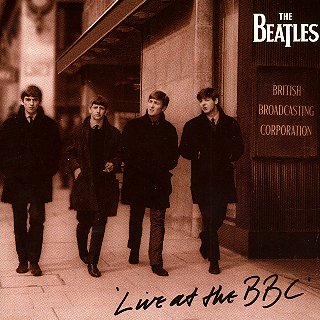
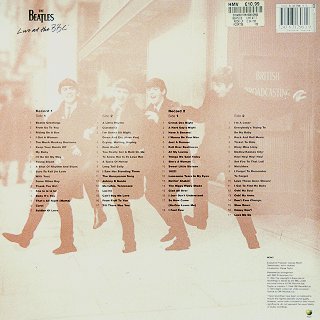
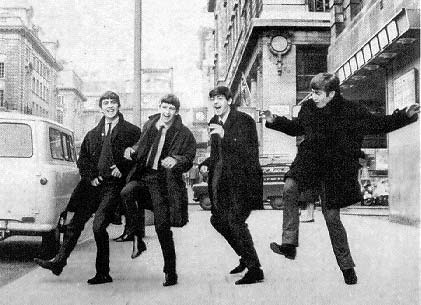
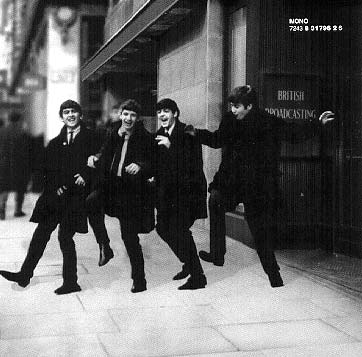
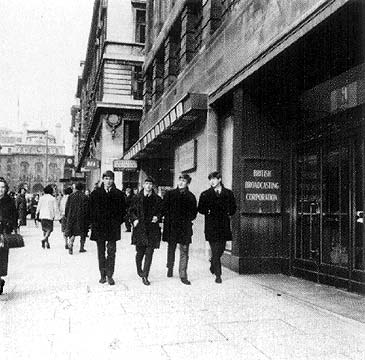
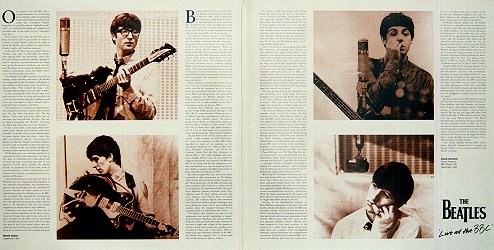
|
| Additional information |
|---|
|
Between March 1962 and June 1965 the Beatles were featured performers in 52 radio programmes on the B.B.C. They sang 88 different songs, of which 36 were never issued officially. In the very early sixties in England there was no commercial radio, no local radio, just three BBC national networks, the "Light Programme", "Home" and the "Third" programme. The British youth (thats me !) were starved of pop music, with the BBC having very strict formats of programme playlists. Brian Epstein realised how essential radio coverage could be in breaking his new band and he wrote for an audition at the B.B.C. in January 1962. On Monday 12th February 1962 the Beatles nervously auditioned at the Beeb's Manchester studios. BBC producer Peter Pilbeam wrote on their audition report, "An unusual group, not as "rocky" as most, more country and western with a tendency to play music." The radio breakthrough came seven months BEFORE "Love Me Do", with their debut at the Manchester Playhouse on 7th March 1962. With Pete Best still on drums, John sang "Memphis Tennessee", "Please Mr. Postman" and "Hello Little Girl" (which was not broadcast), Paul sang "Dream Baby". This recording was broadcast the following evening at 5:00 p.m. on "Teenager's Turn". From January 1963, The Beatles regularly pulled in U.K. audiences of around Ten Million on "Saturday Club" and a myriad of other BBC pop shows, until they received the ultimate recognition from the B.B.C. when they were offered their own show, "Pop Go The Beatles". This double album contains 56 songs made at BBC sessions, digitally remastered and compiled by George Martin, it IS an essential addition to the Beatles catalogue. Here is each radio show The Beatles appeared on and the number of performances they made : The cover photographs are actually digitally manipulated. For an excellent article on them see BBC cover pictures.
The inner sleeves contain full information about each song, it's recording and it's broadcast. Once upon a time the BBC was a young institution in a world long before Beatles, when broadcasting Uncles and Aunties and chaps with names like Commander Stephen King-Hall ("be good but not so frightfully good") and L. du Garde Peach guided our attitudes and provided some of our music for us. I remember those days. If we wanted any rough old stuff like jazz or blues we mostly had to get records or listen to records at friends' houses. This was the would in which the Beatles were children, in what Kevin Howlett rightly calls "wireless innocence". In the early 60's there was an overlap between "wireless" and "radio" in that when the Beatles were making their first broadcasts, Uncle Mac was still playing records for children though by now he was quite a grouch about the way things were going; the modern world was not much for him. But things had to loosen up, lighten up, and instead of admonitory uncles, the Higher Power sent us the breezy boys- next-door. The strength of the BBC was that it was able to manage change and their welcome to the Beatles was magnanimous and the Beatles' willingness to put a girdle round the earth to get on the air was almost selfless. They worked like dogs - once recording eighteen songs in one day (July 16 1963). At first, knowing the value of radio they were glad and proud to use it. In the end, they did it as a duty but nonetheless, long after grabbing world fame, they continued to talk to Britain with a good spirit for, I presume, "scale" fees. This collection is of a distant era; when London was six/eight hours from Liverpool, when London was The Big Times and almost still "The Big Smoke". Trains were still steam. There was no take-away save fish and chips. No "Sun". The rudest thing in newsprint was 'Reveille'. Television was black and white; there was two channels. It was a time when a pop singer plated ballrooms, clubs, Odeons and Gaumonts, with about five others on the bill, maybe comics, ballad singers not quite trapeze artists but close... Some "teen idols" were deplored - still are - but no then the Beatles, not after they became our cheeky chappies, our Elvis, took up residence on the front page and, in the zeitgeist of the age, helped establish the booming creative potential of provincial England. The Beatles gave us a continuing soundtrack of unparalleled charm and reassurance. As long as they kept on delivering fresh songs along with the morning milk, everything was right in our optimistic world. Quite quickly, the Beatles became an institution all of their own, with all sorts of attendants - fanatics and detractors, revisionists and archivists, accountants and lawyers, scribes and Pharisees. That the Beatles were woven into the fabric of British life was due in large part to the regularity of their attention to good habits - the Christmas messages to Liverpool families, an honest paying of all the expected dues and in no small measure to the BBC, who provided that unparalleled broadcasting expertise to keep the nation in touch with "the boys" through fifty two broadcasts. Radio allowed them to "be themselves" and that was always enough for the Beatles and for their followers. Tempting to say those were the days, but of course as we live now, these are the days yet truly, those were happy days and no-one who sat by those transistors or by older receivers and heard that unmistakable friendly music will ever forget how good it felt. If you weren't there, then welcome now and if you haven't yet heard this music, please do so and know that like is indeed still good. - Derek Taylor
|

